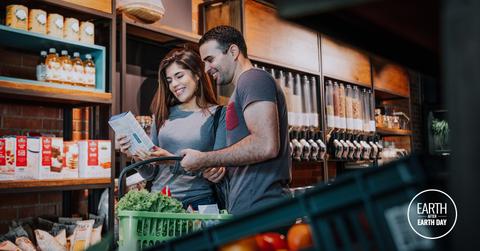6 Tips for Zero-Waste Grocery Shopping, Even if You Don't Have a Bulk Section
Just because you don't live near a bulk shop doesn't mean you can't grocery shop sustainably.
Updated Nov. 19 2020, 9:40 p.m. ET

When you picture zero-waste grocery shopping, rows of endless bulk bins filled with nuts, seeds, grains, and even candy probably come to mind. But while bulk bins make for some easy plastic-free grocery shopping, not everyone has access to them. If no stores in your area offer bulk goods, there are still so many other ways to reduce your waste while grocery shopping.
Not to mention, there are plenty of actions you can take your carbon footprint in your day-to-day life besides just focusing on what you buy at the the grocery store. So if your local supermarket is a plastic wasteland, don't let that stop you from continuing to fight for the planet.
If you do have access to a grocery store with bulk bins, don't be intimidated. Here's a quick step-by-step guide to buying in bulk.
And now, without further ado, here are six tips on low-waste grocery shopping besides just using the bulk bins.
1. Opt for Metal, Paper, or Glass
According to National Geographic, only 9 percent of plastic actually gets recycled. So if you have to buy food in packaging, opt for paper, glass, and metal over plastic whenever possible. In fact, steel has the highest recycling rate in the country, at 88 percent in 2012, according to AZoCleantech. Because of that, if you don't have access to bulk bins, opting for canned versions of foods like beans and lentils is a pretty sustainable option. Hot tip: you can recycle small metal items, such as metal bottle caps and tin can lids, by putting them inside cans and bending the top closed, so that they don't fall out. Check out Recycle Coach for more info on how to do this.
Paper also has a decent recycling rate, at 64.7 percent, according to The Balance Small Business. So if you don't have access to bulk or loose items like pasta or bread, opt for brands that use cardboard or paper packaging.
Glass' recycling rate is a bit lower, at 32.5 percent, as per The Balance Small Business. While some natural grocery stores offer bulk nut butters, vinegars, oils, soy sauce, maple syrup, and more, those items are luckily often packaged in glass, even in conventional grocery stores. Even though glass doesn't have a great recycling rate, it is still more sustainable and more easily recyclable than plastic.
2. Buy the Biggest Container Possible
Not only is buying the largest container possible often a better financial value, but it will also use a little less packaging, and mean you have to restock less often. So for that reason, for any item that you use a lot, look for the largest container the store has. For example, liquids like laundry detergent, hand soap, vinegar, and oil often come in huge bottles that you can use to fill up a smaller container. Additionally, when it comes to staple dry foods (for example, oats, rice, and nuts), buying the biggest bag available will have the same effect.
3. Repurpose Packaging
To some, hummus tubs, sauce jars, snack bags, and cereal boxes are trash (or, hopefully, at least recycling). But even though food packaging is usually designed to be single-use, there's no reason you can't repurpose it. Save plastic containers for storing tchotchkes or for packing up leftovers for friends. Don't throw away the plastic bags that were once packaging for chips, rice, or frozen fruit — instead, save them for messy situations, such as picking up dog poo or kitty litter, or repurpose them as liners for a small trash can. Big fan of cereal? Cut the box open, and use the inside to make a sign for your next climate protest.
4. Keep Your Produce Naked
In some grocery stores, a lot of the produce is packaged in plastic — but luckily, many budget supermarkets, such as Trader Joe's and Aldi, are working on changing that. In the meantime, focus on buying as much loose produce as possible.
Single-use plastic produce bags are totally unnecessary, considering the fact that you're going to wash the produce when you get home anyway. Let your fruit and veg breathe and sit in your cart au naturel, baby! For smaller produce items (like mushrooms or green beans), opt for reusable produce bags. You can invest in a nice matching set from a company like EcoBags, or upcycle small mesh laundry bags.
5. Shop Local
If your grocery store's produce section is a sea of plastic, there are other ways to lower the impact of your fruit and veg. For example, focus on buying food that was grown closer to home, since it had a shorter trip from the farm to the grocery store. Go ahead and be that person who reads the tiny stickers on produce, and find out where it is grown. If the red onions were grown domestically, but the white onions were grown halfway across the world, consider opting for the red.
6. Buy More Plant-Based Food
A 2018 study found that the biggest way to reduce your environmental impact is by implementing a vegan diet. If you're not ready to make the full switch yet, consider making a few simple swaps. Animal products items like cow's milk, butter, cheese, and meat are usually packaged in plastic anyway, so instead, try replacing them with vegan versions, such as plant milk, vegan butter, vegan cheese, and meat alternatives.
Ultimately, being zero waste is not about being perfect and having an empty trash can, but about lowering your environmental impact overall. Even if quitting plastic packaging is virtually impossible where you live, there are so many other ways to reduce your environmental impact.